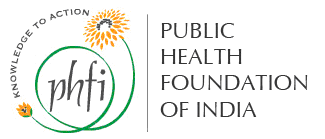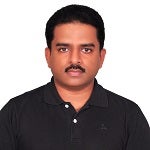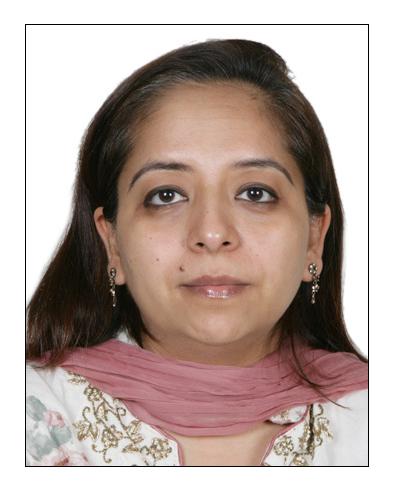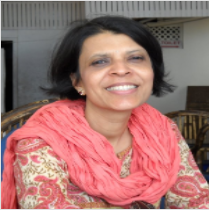 The Public Health Foundation of India (PHFI) is based in New Delhi, India and was launched in 2006 to redress the limited institutional capacity in India for strengthening training, research and policy development in the area of public health. PHFI is now a premier center for health research, education, training, and policy and impact evaluation in India with multi-disciplinary expertise in a range of topic areas including cardiovascular and pulmonary disease, diabetes, maternal /child health, and nutrition. Multiple PHFI centers across the India oversee research portfolios including qualitative and quantitative observational studies, health economics, health systems and health policy impact, health technology innovation, and surveillance. Additionally, PHFI has established Indian Institutes of Public Health at five key locations across the country with the aim of providing world class training in public health. PHFI maintains close collaborative relationships with the Harvard Chan School as well as with Northwestern University and BU School of Public Health, and receives funds from national and international sponsors. The Harvard Chan School and PHFI have recently initiated a joint U01 and U2R program for a GEOHealth hub.
The Public Health Foundation of India (PHFI) is based in New Delhi, India and was launched in 2006 to redress the limited institutional capacity in India for strengthening training, research and policy development in the area of public health. PHFI is now a premier center for health research, education, training, and policy and impact evaluation in India with multi-disciplinary expertise in a range of topic areas including cardiovascular and pulmonary disease, diabetes, maternal /child health, and nutrition. Multiple PHFI centers across the India oversee research portfolios including qualitative and quantitative observational studies, health economics, health systems and health policy impact, health technology innovation, and surveillance. Additionally, PHFI has established Indian Institutes of Public Health at five key locations across the country with the aim of providing world class training in public health. PHFI maintains close collaborative relationships with the Harvard Chan School as well as with Northwestern University and BU School of Public Health, and receives funds from national and international sponsors. The Harvard Chan School and PHFI have recently initiated a joint U01 and U2R program for a GEOHealth hub.
Centre for Chronic Disease Control (CCDC) is a New Delhi based not-for-profit organization, established in December 2000. The mission of CCDC is primarily intended to address the growing challenge of chronic diseases, in varied settings of the developing countries through: Knowledge generation, which can inform policies and empower programmes for the prevention and control of chronic diseasesKnowledge translation intended to operationalize research results by bridging the critical gaps between relevant research and effective implementation, through analytic work, capacity building, advocacy and development of educational resources for enhancing the empowerment of people and professionals CCDC has been recognized as a Scientific and Industrial Research Organization (SIRO) by Department of Scientific & Industrial Research (DSIR), Ministry of Science and Technology, Government of India. It also holds registration under Foreign Contribution (Regulation) Act, 1976.
The Site Director
 Sailesh Mohan, Professor and Director, Centre for Chronic Conditions and Injuries, PHFI and CCDC
Sailesh Mohan, Professor and Director, Centre for Chronic Conditions and Injuries, PHFI and CCDC
smohan@phfi.org, smohan@ccdcindia.org
Dr. Mohan is a public health researcher with training in public health and chronic disease epidemiology. His career spanning nearly two decades, has been focused on research, teaching, and engagement with policy and practice related to non-communicable disease (NCD) prevention and control. His current work is focused on: (a) developing, implementing, and evaluating sustainable comprehensive community and health system-based approaches to hypertension and diabetes prevention and control as well as multimorbidity (b) building the evidence base to support transformation to high quality health systems by improving measurement, testing solutions, and creating generalizable knowledge in partnership with researchers and changemakers in low- and middle-income countries (LMICs) (c) improving food systems by providing policy-makers with interdisciplinary scientific evidence on how food systems can deliver nutritious foods sustainably and equitably, (d) cohort studies (Precision-CARRS,UDAY) to advance understanding of cardiometabolic diseases and (e) training/mentoring junior researchers through training programs to undertake research and improve NCD prevention and control in India and other low-middle income countries (LMICs).
Site Mentors

Dr. Monika Arora, Professor and Director, Health Promotion Division, PHFI
monika.arora@phfi.org
Dr. Arora’s training is in Child Development, Epidemiology, Public Health and Tobacco Control. Her research has largely focused on Non-communicable Disease (NCD) prevention and management with special interest in tobacco control. She has led research studies in India that have explored epidemiology, prevalence and etiology of tobacco use and other NCD risk factors among adolescents and young people, identifying behavioral and psychosocial risk factors associated with these behaviors.

Dr. Shifalika Goenka, Professor, PHFI
shifalika.goenka@phfi.org
Dr. Goenka has expertise in worksite health promotion, both physical, social, political and worksite health promotion for chronic disease prevention, qualitative research methods, climate sensitive and chronic disease preventing environmental interventions, ethics- research ethics and public health ethics, and implementation sciences in the context of chronic diseases. She is head of Physical Activity and Obesity Prevention at the Center for Chronic Disease Control, head of Public Health Ethics at the Public Health Foundation of India and head of Social and Behavioral Sciences at the Indian Institute of Public Health-Delhi.
Dr. Arun Pulikkottil Jose, Deputy Director, Centre for Digital Health, PHFI
arunp.jose@phfi.org
Dr. Jose is a public health specialist and physician by training. In his current position as Deputy Director of the Centre for Digital Health at the Public Health Foundation of India (PHFI), he leads various digital education and tele-health projects in India. This includes an innovative assisted telemedicine initiative that is being implemented in various parts of India. The program is part of the efforts to ensure uninterrupted health access among the poor and vulnerable sections of society during the COVID19 pandemic. He was the Deputy Chair of the South & West Asia, Middle East Regional Advisory Group of the International Society of Hypertension from 2018-20 and has been country leader for the society’s May Measurement Month initiative that has screened over 4.7 million for raised blood pressure across the world and approximately 900,000 individuals in India.
Dr. Dimple Kondal, Assistant Professor, PHFI
dimple@ccdcindia.org
Dr. Kondal is has a broad background in biostatistics, with specific training and expertise in data management and statistical analysis for multivariate statistical methods of classification, longitudinal and missing data analysis techniques. She brings over 10 years of experience in the research, database development and application of statistical methods in public health and epidemiology with a primary focus on the analysis of cross-sectional data, longitudinal data, cluster randomized trial, multilevel modelling and missing data analysis. Dr. Kondal has been involved in the sampling strategy, database development, data management and statistical analysis related to clinical trials, cluster randomised trial and step wedged design. She has also been involved in modelling ambient air pollution exposure using machine learning techniques and linked these exposures with cardiometabolic health outcomes in the CARRS cohort.
Dr. Shyamala Krishna Mani, Senior Advisor, WASH and Waste Management, Centre for Environmental Health, PHFI
shyamala.mani@ext.phfi.org
Dr. Mani is Senior Advisor, WASH and Waste Management, Centre for Environmental Health, Public Health Foundation of India (PHFI) since June 2018. Prior to that, she was a Professor at the National Institute of Urban Affairs (NIUA), New Delhi, a think tank under the Ministry of Housing and Urban Affairs, Govt. of India. Dr. Mani worked as Programme Director, Waste and Resource Management (WaRM) in the Centre for Environment Education for 25 years from 1987 to 2012. At CEE, she did pioneering work of researching and implementing projects in Water, Sanitation and Waste Management including Municipal Solid Waste, Waste Water, Sewage and Septage Treatment plants, Industrial waste water treatment, Biomedical waste management, E-waste management, Plastic waste management and Hazardous waste management. Dr. Mani has been instrumental in research and policy in different aspects of Municipal Solid waste, Biomedical waste, Plastic waste, E-waste and Hazardous waste in India since 1997.
 Professor Dileep Mavalankar, Professor and Director, Indian Institute of Public Health, PHFI
Professor Dileep Mavalankar, Professor and Director, Indian Institute of Public Health, PHFI
dmavalankar@iiphg.org
Prof. Mavalankar has led the Indian Institute of Public Health Gandhinagar as its Director since 2012. His areas of interest include management of Maternal Health programs and health systems improvement, quality of care, reproductive health care, management of services and more recently Climate Change and heat health. Prof. Mavalankar’s current work includes management of maternal health programs, quality of health services and top management capacity for health. He is a consultant to several international organizations including Columbia University, WHO, UNICEF, CARE, Aga Khan Foundation, UNDP/World Bank and government of India’s health and family welfare departments and state governments. He has been a member of several programs & scientific advisory committees including GAVI Switzerland, Mother Care project USA; NIHFW, New Delhi; IIPS, Mumbai; IIHMR Jaipur; IMMPAC Project University of Aberdeen UK, government of India, Planning commission of India, etc. Prof. Mavalankar was appointed by the Prime Minister to the Missions Steering Group of the National Rural Health Mission constituted by the Government of India. He has been part of committees that have shaped the maternal health services in India including PMO nominee of NRHM Mission steering group in 2005-10 and a member of Health steering group of 12th Five-year plan.
 Sailesh Mohan, Professor and Joint Director, PHFI and CCDC
Sailesh Mohan, Professor and Joint Director, PHFI and CCDC
smohan@phfi.org
Dr. Mohan is a public health researcher with training in public health and chronic disease epidemiology. His career spanning over a decade has been focused on research, teaching, and engagement with policy and practice related to non-communicable disease (NCD) prevention and control. Dr. Mohan’s current work is focused on: (a) developing, implementing, and evaluating sustainable comprehensive community and health system-based approaches to hypertension and diabetes prevention and control (b) improving food systems by providing policy-makers with interdisciplinary scientific evidence on how food systems can deliver nutritious foods sustainably and equitably and (c) training/mentoring junior researchers through training programs to undertake research and improve NCD prevention and control in India and other low-middle income countries.
Dr. Dorairaj Prabhakaran, Vice President of Research and Policy and Director, Centre for Control of Chronic Conditions, PHFI
dprabhakaran@ccdcindia.org
Dr. Prabhakaran is a Cardiologist, Epidemiologist, and Director of the Centre for Chronic Disease Control (CCDC). His career has been commitment to preventive cardiology. He is a Professor at the London School of Hygiene and Tropical Medicine, London, UK and adjunct Professor at the Rollins School of Public health, Emory University, Atlanta, USA. Dr. Prabhakaran has participated in several major international and national research studies funded by diverse international and national institutions, including the U.S. National Institutes of Health, Wellcome Trust, the Canadian Institute of Health Research, the European commission, and the Indian Council of Medical Research. Over the past ten years, he has led the design and conduct of the CARRS cohort, which is a large cohort in three urban locations of South Asia (Delhi, Chennai and Karachi) that has provided several mechanistic insights into the high propensity for cardiovascular disease and diabetes in South Asians. In addition, he is the PI of the GEOHEALTH program (funded by Fogarty International Centre) in India which primarily aims to evaluate the relationship of ambient air pollution with CVD and its risk factors.

Dr. Kranti Suresh Vora, Additional Professor, Indian Institute of Public Health Gandhinagar
kvora@iiphg.org
Dr. Vora is an Obstetrician and a public health expert with extensive experience in the area of maternal health. She has been an Associate Professor at IIPHG since October 2012. Her past experience extends from private practice specializing in infertility to working in UNFPA-led Government of Gujarat project and in academic institutes. Dr. Vora started her public health career as a consultant in SEWA, Ahmedabad and has also worked on AMDD project at Indian Institute of Management, Ahmedabad. She is currently engaged in managing various projects in maternal health area including evaluation of programs such as CY/JSY with international partners such as Karolinska Institutet, Sweden and University of Aberdeen, UK. She has worked on international projects on maternal health such as “WASH situation of labor wards in India and Bangladesh” with the University of Aberdeen, UK and BRAC, Bangladesh.
 Dr. Deepak Saxena, Associate Professor, Indian Institute of Public Health-Gandhinagar
Dr. Deepak Saxena, Associate Professor, Indian Institute of Public Health-Gandhinagar
Dr. Deepak Saxena is a Physician by training with an MD in Community Medicine. He is also PhD in Epidemiology and Post Doc in Public Health from Centre of Global Health (IHCAR), Krolinsika Institute, and Stockholm Sweden. At IIPHG he is a member of NIDHI-Techno business Incubation center and Regional Resource center for Health Technology Assessment. He is also a team member for generating Evidences to WASH in Health Care Facility at WHO-HQ. His major are of interest include: One Health, Infectious Diseases & Neglected Tropical Diseases, WASH, AMR and Drug Resistance TB, Health systems strengthening & Developing Epidemiological Cohorts. He also leads the e learning courses at IIPHG. He has authored five books and Monographs on various aspects of converging Epidemiological learnings in improving program implementation and evaluation. He has more than 100 publications in National and International Peer reviewed Journals and is Editor to Indian Journal of Community Medicine (IJCM) since 2015.

